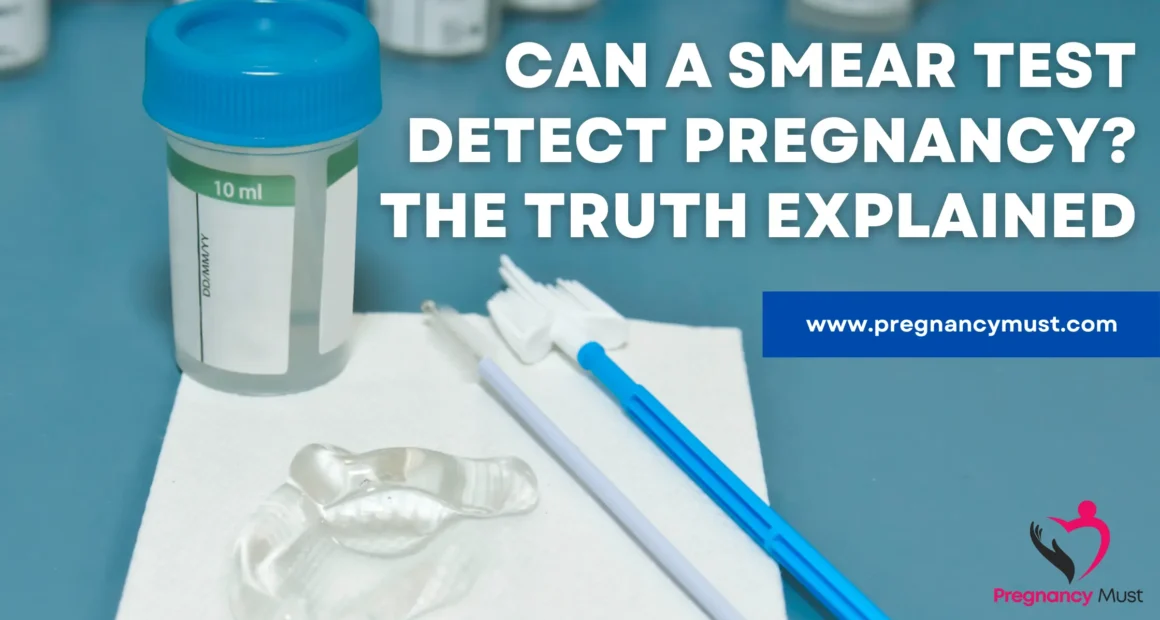You’re not the only person who has ever doubted can a Smear test detect Pregnancy. During routine gynecological appointments, many women ask this question, mostly if they are uncertain about getting pregnant. Here we are to clarify what a smear test is, what it can detect, and whether can a Smear test detect pregnancy or not in this blog.
Table of Contents
- Smear Test: What Is It?
- In What Ways Can a Smear Test Detect Pregnancy?
- Why It’s Important to Avoid Smear Tests During Pregnancy
- How to Proceed Before a Smear Test If You Suspect Pregnancy
- How Cervical Issues and Pregnancy Symptoms May Intersect
- Is There Anything Pregnancy-Related About Cervical Cells?
- When Is a Smear Test Necessary?
- Conclusion: Pregnancy Test vs. Smear Test
Smear Test: What Is It?
The key purpose of a smear test, also called a Pap smear or Pap test, is to detect precancerous or cancerous alterations in the cervix. A tiny sample of cells is collected from the cervix for the test and then analyzed in the laboratory.
The main objective of the smear test is to screen abnormalities carried on by the human papillomavirus (HPV) or cervical cancer. Although pregnancy-related changes may occasionally be accidentally observed under a microscope, it is not intended to identify pregnancy.
In What Ways Can a Smear Test Detect Pregnancy?
From a technical point of view, a smear test cannot identify pregnancy. It is not a diagnostic tool for assessing hormonal changes or fertility, nor is it a pregnancy test. Urine, blood, or ultrasound tests are the most effective ways to identify pregnancy because they search for the hormone hCG (human chorionic gonadotropin), which a smear test cannot measure or identify.
Due to pregnancy, some changes result in cervical such as softer tissue or an increase in vascularity. Although a qualified medical practitioner may occasionally observe these subtle signs during a pelvic exam, they are not reliable indicators of pregnancy and should not be taken at face value.
Why It’s Important to Avoid Smear Tests During Pregnancy
You should let your doctor know if you are pregnant or think you may before getting a smear test. Unless there is an urgent medical reason, the test is typically delayed until after childbirth even though it poses no threat to the fetus. This is because pregnancy can alter cervical cells, which could produce false results and necessitate needless follow-up treatments.
How to Proceed Before a Smear Test If You Suspect Pregnancy
You should take a home pregnancy test in advance if you suspect pregnancy or if you are scheduled for a smear test. Such test kits are very accurate after a missed period, non-invasive, and reasonable in price. Talk to your healthcare provider about the results if they are positive so they can decide how best to proceed with cervical screening.
How Cervical Issues and Pregnancy Symptoms May Intersect
Some early pregnancy symptoms, like mild cramping, spotting, or discharge, can be confused with cervical issues. Some people think a smear test could help confirm pregnancy because of this confusion. Yet, a Pap smear is not the proper diagnostic procedure in this case because pregnancy-related cervical changes differ greatly from those brought on by aberrant cell growth.
Is There Anything Pregnancy-Related About Cervical Cells?
A smear test is for detecting abnormal changes in cervical cells, but not able to provide any information about pregnancy markers like hormones. During the test, any observations regarding a woman’s reproductive status are entirely incidental. This demonstrates why the only accurate way to confirm conception is with a proper pregnancy test.
When Is a Smear Test Necessary?
Keeping aside the argument of whether can a Smear test detect pregnancy or not let’s talk about the necessity of the test. The smear test is undoubtedly necessary. It is recommended by the majority of health authorities to start routine smear test from the age of 21 and continue in a three- or five-year gap. Specific cervical screening recommendations may differ based on your location. Screenings may be modified if you are pregnant to prevent complications or incorrect interpretation of the results.
Conclusion: Pregnancy Test vs. Smear Test
In conclusion, can a Smear test detect pregnancy? It can’t, that’s for sure. Although it doesn’t measure pregnancy-related hormones or offer definitive proof of conception, it is essential in preventing cervical cancer. Use an ultrasound, blood test, or home pregnancy test if you’re not sure of your reproductive status, and always let your doctor know.









